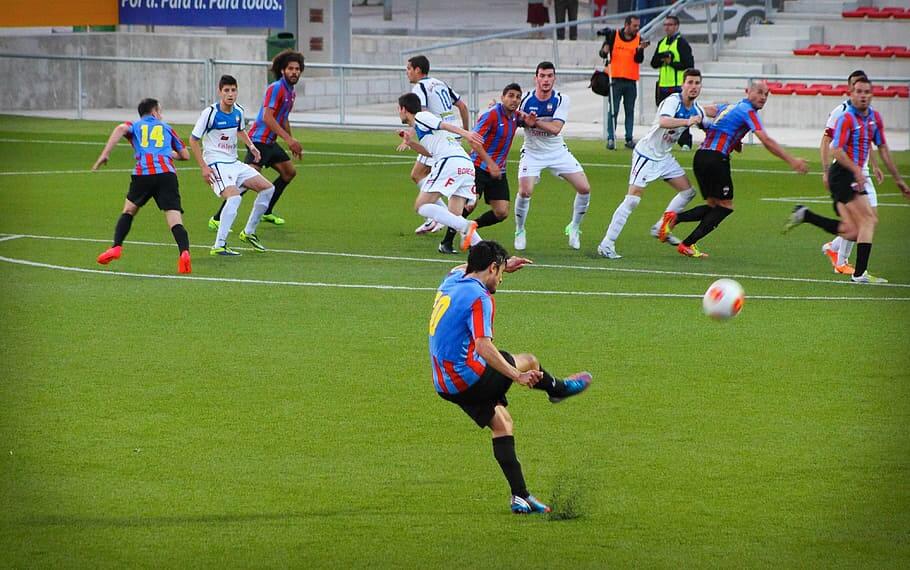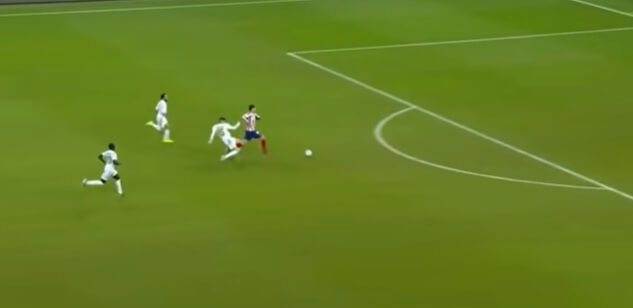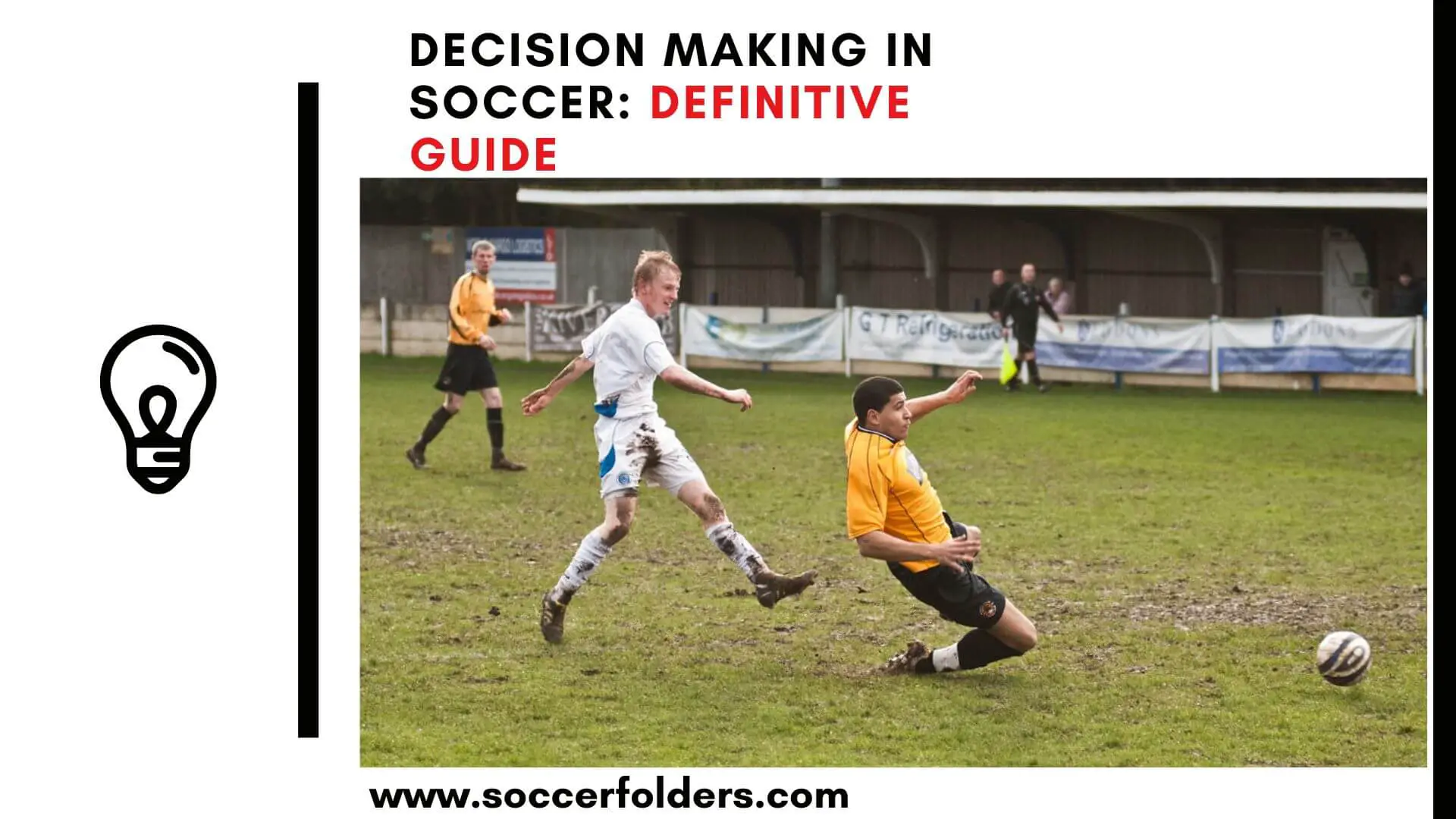Welcome to the world of soccer, where split-second decisions can be the difference between triumph and defeat. The beautiful game demands not only physical prowess but also mental agility and strategic thinking.
In this article, we’ll delve into the intricate realm of decision-making in soccer, exploring how players at all levels can elevate their game through astute choices on the pitch.
Whether you’re an aspiring player, a devoted fan, or simply curious about the inner workings of this global phenomenon, read on to unlock the secrets of tactical brilliance in soccer.
Quick Navigation
- What is Decision Making in Soccer/Football?
-
How to Make the Right Decision on the Field?
-
Why is Decision Making Important in Football/Soccer?
-
How do you Practice Decision Making in Soccer?
-
How to Improve Decision Making in Soccer?
- Anticipation
- Assessing Options
- Adaptability
- Communication
- Embracing Risk
- Conclusion
What is Decision Making in Soccer/Football?
Decision making in soccer is the process of analyzing various options in real-time and choosing the most effective course of action. It involves assessing the game situation, anticipating opponents’ moves, and executing intelligent choices to achieve strategic objectives.
How to Make the Right Decision on the Field?

Making the right decisions on the soccer field is a blend of intuition, analysis, and experience. Here’s a guide to help you navigate the path of optimal decision making:
1. Assess the Situation:
Evaluate the game context, including the score, time remaining, field position, and the positions of teammates and opponents. Understanding the current situation provides a foundation for informed decision making.
2. Anticipate and Visualize:
Anticipate potential outcomes based on the available options. Visualize the consequences of different decisions, envisioning the positive and negative effects they may yield. This mental rehearsal prepares you to react quickly and make the best choice.
3. Consider Multiple Options:
Analyze all available options before making a decision. Assess passing lanes, potential runs, and openings in the defense. Evaluate the risks and rewards associated with each choice, weighing the potential benefits against the potential drawbacks.
4. Trust Your Instincts:
Soccer is a game of split-second decisions, and sometimes instinct plays a crucial role. Trust your intuition and rely on your years of experience and training. Often, your instincts guide you towards the right decision.
For example, during the 2020 Super Cup finale between Real Madrid and Atletico Madrid, Morata was running to face Madrid’s goalie in a one-on-one, but Valverde made the decision to tackle and sacrifice for the team.
We guess it was the right decision as Madrid ended up winning in penalties.

5. Maintain Composure:
Amidst the chaos of the game, it’s vital to stay composed. Avoid making impulsive decisions driven by frustration or pressure. Clear your mind, focus on the task at hand, and make decisions with a calm and rational mindset.
6. Communicate and Collaborate:
Soccer is a team sport, and effective decision making involves communication and collaboration with teammates. Verbally communicate your intentions, use non-verbal cues, and coordinate your movements to align with your teammates’ decisions.
7. Learn from Mistakes:
Mistakes happen, even to the best players. Instead of dwelling on them, use errors as opportunities for growth. Analyze what led to the wrong decision and learn from it. Reflecting on past mistakes enhances your decision-making abilities over time.
8. Continuous Learning:
Soccer is an evolving game, and decision making evolves with it. Stay updated on the latest tactics, strategies, and trends. Observe top players, study their decision-making abilities, and adapt your approach accordingly.
9. Seek Feedback and Guidance:
Seek feedback from coaches, teammates, or mentors. They can provide valuable insights and help identify areas for improvement. Collaborative learning fosters better decision making and enhances your overall game understanding.
10. Practice Deliberately:
Decision making improves with deliberate practice. Engage in decision-specific drills, small-sided games, and match simulations. Replicate game scenarios and practice making choices under pressure to sharpen your decision-making skills.
Remember, making the right decisions on the field is a continuous process that combines analysis, intuition, and experience. Embrace the challenge, trust your instincts, and strive for constant improvement. With time and dedication, you can become a master decision maker on the soccer field.
Why is Decision Making Important in Football/Soccer?
Decision making holds immense significance in the game of soccer due to several key reasons:
1. Rapid Pace
Soccer is a fast-paced sport where players must make split-second decisions. The ability to assess the situation quickly and make the right choice can determine the outcome of a match.
2. Strategic Execution
Effective decision making allows players to execute strategic plans on the field. It involves analyzing options, anticipating opponents’ moves, and choosing the most advantageous course of action to achieve team objectives.
3. Maintaining Possession
Good decision making helps teams maintain possession of the ball, enabling them to control the flow of the game. Players who make intelligent choices in passing, dribbling, and positioning enhance their team’s ability to dominate the match.
4. Creating Scoring Opportunities
Making sound decisions in soccer leads to the creation of scoring opportunities. By recognizing openings in the defense, identifying teammates in advantageous positions, and choosing the right pass or shot, players can greatly influence the outcome of a game.
5. Defensive Organization
Decision Making isn’t limited to attacking situations; it is equally crucial in defense. Proper decision making allows defenders to anticipate and react to opponents’ moves, mark players effectively, and make timely tackles or interceptions.
6. Team Cohesion
Sound decision making fosters strong team cohesion. When players make decisions that align with their teammates’ movements and intentions, it creates fluidity and synchronization on the field, leading to a more effective and cohesive team performance.
7. Psychological Impact
Decision Making can have a psychological impact on both teams. Players who consistently make astute choices boost their own confidence and that of their teammates, while also undermining the confidence of their opponents. This psychological advantage can significantly influence the outcome of a match.
How do you Practice Decision Making in Soccer?
Practicing decision making in soccer is crucial for honing your skills and elevating your game to new heights. Here are some effective ways to sharpen your decision-making abilities on the pitch:
1. Small-Sided Games:
Engage in small-sided games with limited space and players. This forces you to make quick decisions under pressure and adapt to rapidly changing situations.
2. Position-Specific Drills:
Tailor drills to your specific position, focusing on decision-making scenarios relevant to your role on the field. For example, midfielders can practice identifying passing options and making split-second decisions to maintain possession or launch an attack.
3. Video Analysis:
Analyze game footage, paying close attention to successful decision-making moments by top players. Observe their positioning, movement, and choices, and try to replicate their thought processes in similar situations.
4. Tactical Discussions:
Engage in tactical discussions with teammates, coaches, or fellow players. Exchange ideas, analyze game situations, and brainstorm alternative decision-making approaches. This collaborative process helps expand your understanding of the game and exposes you to different perspectives.
5. Cognitive Training:
Incorporate cognitive exercises into your training routine. These can include visualizing game scenarios, practising mental imagery, and improving reaction time through specialized drills. Enhancing your cognitive abilities can have a significant impact on your decision-making speed and accuracy.
6. Game Intelligence Workouts:
Engage in specific workouts that challenge your game intelligence. This can involve setting up scenarios where you have limited time to make decisions, forcing you to think quickly and critically.
7. Play against Higher-Level Opposition:
Seek opportunities to play against more skilled opponents or join teams that compete at a higher level. This will expose you to faster-paced games and test your decision-making abilities under challenging circumstances.
Remember, decision making is a skill that improves with deliberate practice and experience. By incorporating these strategies into your training regimen, you can enhance your soccer IQ and become a master of decision making on the field.
How to Improve Decision Making in Soccer?
Improving decision-making skills is a continuous process that requires dedication and practice. Here are some effective strategies to enhance decision making in soccer:
1. Game Awareness:
Develop a strong sense of game awareness by observing and analyzing matches. Pay attention to the positioning, movements, and decisions of top players in various game situations. This helps expand your understanding of the game and exposes you to different decision-making approaches.
2. Replicate Match Scenarios:
Create realistic training scenarios that mimic game situations. Simulate pressure, time constraints, and varying game contexts to practice decision-making under realistic conditions. This allows you to develop the ability to make effective choices in high-pressure situations.
3. Mental Visualization:
Practice mental visualization techniques to improve decision-making skills. Imagine different scenarios, visualize yourself making the right choices, and anticipate potential outcomes. This mental rehearsal enhances your ability to make quick and accurate decisions on the field.
4. Analyze Game Footage:
Study game footage, both from your own performances and professional matches. Analyze your decision-making moments and identify areas for improvement. Observe successful decision-making instances and learn from top players’ strategies and choices.
5. Seek Feedback:
Seek feedback from coaches, teammates, and experienced players. Their insights can provide valuable perspectives and help identify areas of improvement in your decision-making abilities. Embrace constructive criticism and use it to refine your decision-making skills.
6. Increase Game Intelligence:
Develop your game intelligence by deepening your understanding of soccer tactics, formations, and strategies. Study different playing styles, team dynamics, and game plans. This knowledge equips you with a broader repertoire of decision-making options.
7. Improve Physical Conditioning:
Enhance your physical conditioning to support decision making. When you are physically fit, you can process information more efficiently, maintain focus for longer durations, and execute decisions with greater precision.
8. Play Different Positions:
Experiment with playing different positions on the field. This provides a holistic perspective and helps you understand the decision-making requirements of various roles. Broadening your positional experience enhances your overall soccer intelligence.
9. Analyze and Reflect:
Regularly reflect on your decision-making performance after matches or training sessions. Identify instances where you made effective decisions and areas where improvements can be made. This self-analysis promotes continuous growth and learning.
10. Consistent Practice:
Consistency is vital to improving decision making in soccer. Regularly incorporate decision-making drills, small-sided games, and match simulations into your training routine. The more you practice making decisions, the more instinctive and accurate they become.
Remember, improving decision making in soccer is a gradual process. Stay patient, maintain a growth mindset, and embrace every opportunity to enhance your decision-making abilities.
With dedication and perseverance, you can elevate your game and become a master decision maker on the soccer field.
Anticipation
The Key to Unlocking Success In the fast-paced world of soccer, anticipation is the secret weapon of champions.
A player’s ability to read the game, anticipate their opponent’s moves and foresee potential scenarios can make all the difference.
Players can position themselves strategically by honing this skill, intercepting passes, and launching counterattacks.
A memorable example of anticipation leading to triumph is when Zinedine Zidane’s iconic goal in the 2002 UEFA Champions League final showcased his uncanny ability to predict the trajectory of a corner kick, securing victory for Real Madrid.
Assessing Options
The Chessboard of Soccer Just as a chess player contemplates multiple moves before executing a strategy, soccer players must assess their options swiftly.
The ability to evaluate passing lanes, identify open teammates, and exploit weaknesses in the opposition’s defense is a testament to the cerebral nature of the game.
By training their minds to analyze various scenarios, players can make more informed decisions that maximize their team’s attacking potential.
Lionel Messi’s extraordinary vision and spatial awareness have repeatedly proven to be game-changers, as he effortlessly spots gaps in the defense that others fail to see.
Adaptability
Pivoting in the Face of Change Soccer is a dynamic sport, that demands adaptability and flexibility from its participants.
As the game evolves, players must adjust their decision-making processes accordingly. In the heat of battle, split-second adjustments can turn a seemingly dire situation into an advantageous one.
The legendary Brazilian full-back, Roberto Carlos, was renowned for his adaptability, transitioning seamlessly from a defensive role to a marauding attacker.
Communication
The Art of Silent Collaboration In soccer, effective decision-making is not limited to individual brilliance. It extends to the collaborative effort of an entire team.
Effective communication, both verbal and non-verbal, is crucial for success on the pitch.
The ability to convey intentions, alert teammates to potential dangers, and synchronize movements is the cornerstone of a well-oiled soccer machine.
Take the example of the Spanish national team’s success during their golden era. Their fluid style of play was a testament to their seamless communication and understanding of each other’s decisions.
Embracing Risk
The Courage to Innovate Great decision-makers in soccer aren’t afraid to take calculated risks.
Whether it’s attempting an audacious dribble or launching a long-range shot, these bold choices can change the course of a match.
The Dutch legend, Johan Cruyff, revolutionized the game with his innovative “Cruyff Turn,” confounding defenders and creating scoring opportunities.
By embracing risk and experimenting with unconventional tactics, you can surprise your opponents and push the boundaries of what’s possible on the field.
Conclusion
Decision making in soccer is a captivating blend of strategic thinking, instinct, and creativity.
By cultivating anticipation, assessing options, embracing adaptability, nurturing communication, and embracing risk, players can elevate their decision-making prowess to new heights.
Remember, the true essence of the game lies not only in physical abilities but also in the intellectual battle unfolding on the pitch.
So, embrace the challenges, trust your instincts, and become a master of decision-making in soccer. Step onto the field, armed with tactical brilliance, and let the game unfold in your favour.


